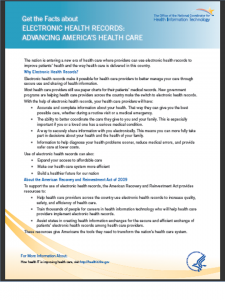Save the Date: ONC 2010 Update Webcast
December 14-15, 2010
Received via email from Office of National Coordinator (ONC) for Health IT on 12/8/2010:
To participate in the Webcast, click here. No pre-registration required.
Please join the Office of the National Coordinator for Health Information Technology (ONC) for a live webcast of plenary sessions as part of the 2010 ONC Update on December 14-15, 2010.
Ten sessions, offered over the two-day period, will provide an overview of programs brought about by the Health Information Technology for Economic and Clinical Health (HITECH) Act to help participants gain a better understanding of how these programs will address barriers and support providers in achieving meaningful use.
The sessions will also provide an overview of ONC’s vision and strategy for improving health and health care through information technology and will offer a detailed look at key elements of ONC and related HHS programs, including:
• Overview of HITECH programs designed to support providers in achieving meaningful use, including the extension center program and ONC’s many workforce development programs
• Update on privacy regulations and activities in the Office of the Chief Privacy Officer
• Overview of the Medicare and Medicaid EHR Incentive Programs
• Strategies for getting to health information exchange
• Promoting patient-centered care delivery by empowering consumers and engaging the public
• Strategies for improving care and population health
• Encouraging innovation, rapid learning and technological advancement
Speakers include:
• Kathleen Sebelius, U.S. Department of Health and Human Services Secretary
• David Blumenthal, MD, MPP, National Coordinator for Health Information Technology, ONC
• Farzad Mostashari, MD, ScM, Deputy National Coordinator for Programs and Policy, ONC
• Joy Pritts, JD, HHS Chief Privacy Officer, ONC
• Don Berwick, MD, Administrator, Centers for Medicare & Medicaid Services
• Thomas R. Frieden, MD, MPH, Director, Centers for Disease Control and Prevention
• Todd Park, Chief Technology Officer, HHS
• Other Health IT leaders and professionals
An agenda of the meeting is available at http://healthit.hhs.gov/ONCMeeting2010 [or see below].
To participate in the Webcast, click here. No pre-registration required.
2010 ONC Update – Meeting Agenda
December 14 – 15, 2010
Available via Live Webcast [Details to come]
Information on how to participate in the webcast will be posted on the agenda before the meeting.
Tuesday, December 14, 2010
8:30 – 9:00 am Opening Remarks
Kathleen Sebelius, Secretary
U.S. Department of Health and Human Services (HHS)
Introduction by David Blumenthal, MD, MPP
National Coordinator for Health Information Technology
Office of the National Coordinator for Health Information Technology (ONC), HHS
9:00 – 9:45 am
An Overview of ONC’s Vision and the Role of Health IT and HITECH in Health System Change and Health Care Reform
David Blumenthal, MD, MPP
National Coordinator for Health Information Technology, ONC
Donald Berwick, MD
Administrator, Centers for Medicare and Medicaid Services (CMS), HHS
9:45 – 10:15 am
An Overview of ONC’s Strategy and Programs
Farzad Mostashari, MD, ScM, Deputy National Coordinator for Programs and Policy, ONC
10:15 – 11:00 am
Break
11:00 – 12:15 pm
Update on Privacy Regulations and Activities in the Office of the Chief Privacy Officer
Joy Pritts, JD, HHS Chief Privacy Officer, ONC
12:15 – 12:30 pm
Break
12:30 – 2:00 pm
Getting to Health Information Exchange
Farzad Mostashari, MD, ScM, Deputy National Coordinator for Programs and Policy, ONC
Doug Fridsma, MD, PhD, Director, Office of Standards and Interoperability, ONC
Claudia Williams, Acting Director, State Health Information Exchange Program, ONC
2:00 – 2:15 pm
Break
2:15 – 3:30 pm
An Overview of HITECH Programs Supporting Providers in Achieving Meaningful Use
Moderator:
Mat Kendall, Director, Office of Provider Adoption and Support, ONC
Panelists:
Paul Kleeberg, MD, Clinical Director, REACH
Robyn Leone, Regional Extension Center Director, Colorado Regional Health Information Organization
Norma Morganti, Executive Director, Midwest Community College Health IT Consortium, led by Cuyahoga Community College
Rick Shoup, Director, Massachusetts eHealth Institute
3:30 – 3:45 pm
Break
3:45 – 5:00 pm
An Overview of Medicare and Medicaid Incentive Programs
Moderator:
Michelle Mills, CMS
Panelists:
Robert Anthony, CMS
Elizabeth Holland, CMS
Jessica Kahn, CMS
Wednesday, December 15, 2010
9:30 – 10:45 am
Promoting Patient-Centered Care Delivery by Empowering Consumers, Engaging the Public
Moderator:
Joshua Seidman, PhD, Director, Meaningful Use, ONC
Panelists:
Christine Bechtel, Vice President, National Partnership for Women and Families
Silas Buchanan, Director of E-Health Initiatives, The Cave Institute
Tom Sellers, MPA, President and Chief Executive Officer, 11-Year Cancer Survivor, National Coalition for Cancer Survivorship
10:45 – 1:00 pm
Break
1:00 – 1:45 pm
The Role of HITECH in Supporting Public Health Goals
Thomas R. Frieden, MD, MPH, Director, Centers for Disease Control and Prevention, HHS
2:00 – 3:15 pm
Encouraging Innovation: Rapid Learning and Technological Advancement
Todd Park, Chief Technology Officer, HHS
3:15 – 3:30 pm
Break|
3:30 – 4:00 pm
Closing Remarks
Farzad Mostashari, MD, ScM, Deputy National Coordinator for Programs and Policy, ONC

